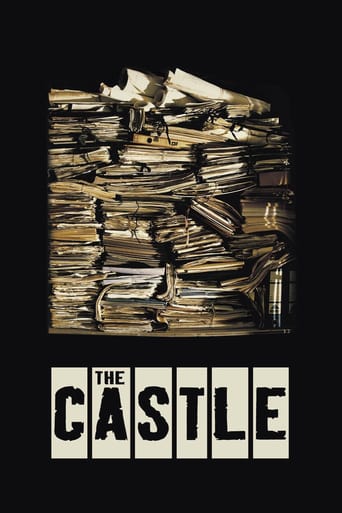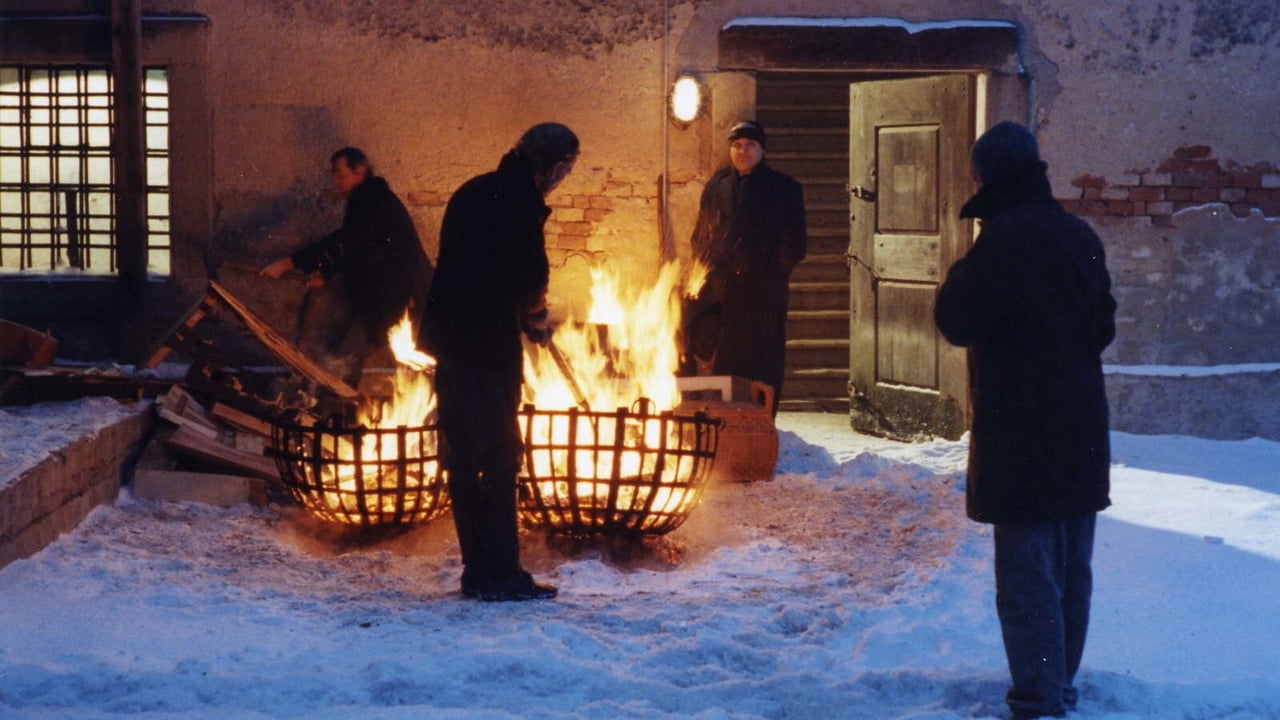Hitchcoc
This, apparently was made for TV by Michael Haneke. After having seen "The Trial" and read pretty much all the works of Kafka, one comes to expect something. Unlike the former, the protagonist is given many options, but never seems as confused as Joseph K was. He seems to feel that his job as a land surveyor trumps virtually anything, even though he is obviously not wanted. He will betray, barge in on, and do anything with the strange people he encounters, including marrying one of them, to get to that Castle. But as is the case with the existentialists, his path is as much a part of the thing, cold and dank and full of trauma, as ever actually reaching the Castle. And, why should such a place need a surveyor anyway. This is a nightmare come to life. He meets his assistants, a couple of twin "boys" and they have no surveying equipment. They have no knowledge of surveying, and yet off they go. Or sort of. It is an endless tromp through snow and buildings and meetings with obstructionists. And so it goes.
Horst in Translation (filmreviews@web.de)
"Das Schloß" or "The Castle" is a German/Austrian co-production from almost 20 years ago and writer and director Michael Haneke made this one the very same year he released the original "Funny Games". For this one here, he adapted the work of famous author Franz Kafka and I guess this is also the main problem I had with this one. The material just wasn't interesting enough to me. I quite like some of Haneke's other stuff, but this one not so much. He cast many people that also appeared in other works of his, such as lead actor Ulrich Mühe, Susanne Lothar and Frank Giering, sadly all of them dies untimely deaths. "The Castle" is a television production that runs for over 2 hours and I cannot deny it dragged on many occasions.I think the acting and direction in here is pretty good, as usual with Haneke/Mühe etc. but the base material just did not do too much for me. I was very bored by the story and the massive runtime certainly did not help at all. It is a very bleak and atmospheric watch as you are used to if you have seen some of Haneke's other works, but this alone cannot make up for all the other flaws in this film. I personally do not recommend checking it out unless you are a huge fan of Kafka's work, this one here or just in general. Everybody else should stay away. Thumbs down.
rstout3526
The scenes generally play out as they do in the novel, including the gaps from the novel, Haneke's view of Kafka's satirisation of bureaucracy. In 'Das Schloss' Kafka is at his usual absurd and pessimistic yet still very realistic idea of the world and the state. Themes and archetypes of alienation, physical and psychological brutality, parent–child conflict, characters on a terrifying quest, and mystical transformations. In existentialism, the individual's starting point is characterised by what has been called the existential attitude, or a sense of disorientation and confusion in the face of an apparently meaningless or absurd world. This is the film of the unfinished novel. It expertly captures the abject, horrifyingly ridiculous, paranoia existentialist view of Kafka. A land surveyor named 'K' is invited to the Castle to do some work for a Count, but when he arrives at a Village where he finds that nobody is expecting him. K's attempts to get into the Castle are as unsuccessful as his attempt to settle into the local village. Greeted but not welcomed by a collective reluctance from the villagers, who with a systematic inefficiency prevent him from any prospects of even approaching the castle. The harder the stubborn K tries, the more he moves from his goals. You never see either the Count or indeed The Castle. The whole series of events is shot during winter with a grainy effect - possibly as a result of a TV transfer to DVD. The film was originally made for Austrian TV. The film ends as the book does - unfinished. The late Ulrich Mühe and Sussane Lothar are exceptional. With respect to perhaps Orson Welles, this film could not be made by mainstream Hollywood - they wouldn't know what to do with it! Although the film is certainly not for everyone, perhaps for Haneke fans only.
Martin Teller
I'm crazy about Kafka. THE TRIAL is my favorite by Welles, and Juracek's homage Joseph KILLIAN is brilliant as well. So the thought of Haneke directing The Castle seemed like a promising idea. And he gets some of it right. The story is very faithful... obviously certain omissions are necessary, but the gist of it is there, and the scenes generally play out as they do in the novel. The long scenes juxtaposed with abrupt time cuts do a good job of evoking the unusual rhythms of Kafka. And Haneke knows better than to try to make K. an entirely sympathetic character. But it doesn't feel quite right. I have mixed feelings about the aesthetic. The drab palette is appropriate, but I couldn't help thinking that black and white would have suited the material better. And the voice-over felt entirely unnecessary to me. The novel is told in the third person voice, but it feels first person. Having some narrator chime in every few minutes didn't add anything. And it just didn't seem absurd enough. Perhaps it's a book that doesn't condense well, because you don't get the sense of K.'s epic, labyrinthine struggle. But it's a good effort.



 AD
AD



